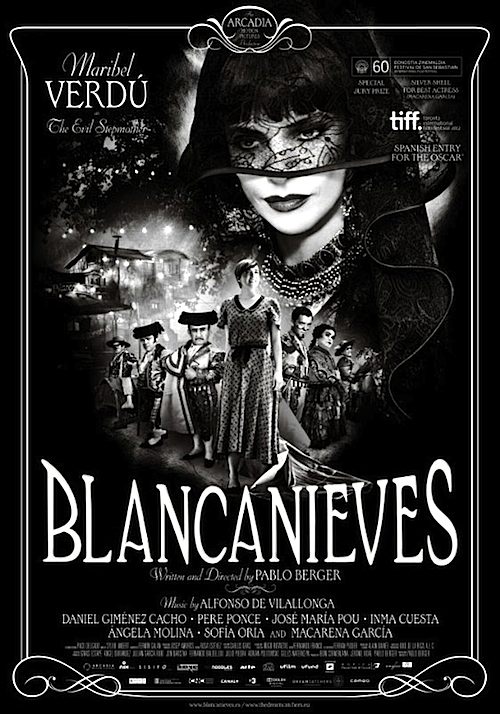By Joe Bendel. It often seems like the Academy’s rules for the best foreign language category are obscure and arbitrarily applied. Frankly, the only language spoken in Spain’s official submission is body language. Yet Pablo Berger’s silent film qualified. In fairness, it is about as Spanish as it gets, earning eighteen Goya nominations for combining the Snow White fairy tale with the rich tradition of bullfighting. Unfortunately, Blancanieves will not repeat The Artist’s Oscar success, failing to even reach the foreign language shortlist. However, it should still find considerable arthouse love when it opens this Friday in New York.
Antonio Villalta was a great matador, but one day he faced one bull too many. As the paralyzed Villalta lies upon the operating table, his beloved sadly dies in child birth. Recognizing a ticket to the easy life, the cold, calculating nurse Encarna sets her sites on the weakened widower. Yes, you could say she is an evil stepmother to young Carmen. Initially raised by her grandmother, Carmen is forced to become a servant on the Villalta estate after the kindly old woman’s death. Though forbidden to see her father, she starts paying furtive visits to the equally miserable Villalta. Even confined to his wheelchair, Villalta teaches her everything about the family business. It will be a useful skill when things come to a head with Encarna.
 Suffering from amnesia, Carmen falls in with an itinerant company of diminutive novelty bullfighters. When her innate talent and extensive training are revealed, the troupe is quickly redubbed “Blancanieves and the Seven Dwarfs.” They seem to be one dwarf short, but they are never sticklers for details in Spain. Obviously, the act is a hit, which perturbs Encarna and you know what that means.
Suffering from amnesia, Carmen falls in with an itinerant company of diminutive novelty bullfighters. When her innate talent and extensive training are revealed, the troupe is quickly redubbed “Blancanieves and the Seven Dwarfs.” They seem to be one dwarf short, but they are never sticklers for details in Spain. Obviously, the act is a hit, which perturbs Encarna and you know what that means.
Blancanieves is the third Snow White adaptation in about a year’s time and by far the best. Yet it will draw far more comparisons to Michel Hazanavicius’s Artist than to Kristen Stewart’s home-wrecking Huntsman. Without question, Berger is a much richer visual stylist than the Oscar winning director. On the other hand Hazanavicius’s elegantly light touch, flair for physical comedy, and old fashioned romanticism are ultimately a tad more satisfying. Nonetheless, Berger frames some stunningly expressionistic tableaux and his transitions are a show unto themselves. However, he embraces all of the tragic heaviness of the Brothers Grimm and almost none of their macabre fantasy.
The cast is also quite strong (but again The Artist’s ensemble would narrowly take the honors in a face-off). Daniel Giménez Cacho’s work as Villalta is particularly poignant and the dwarfs stand head-and-shoulders above their more famous counterparts in Huntsman. Sofía Oria is also quite touching as young Carmen (while Macarena García’s older incarnation is somewhat less so).
Watching Blancanieves, one is struck by the painstaking composition of each shot and the care taken to perfectly match every note of Alfonso de Vilallonga’s score (featuring both sweeping orchestral pieces and some infectious flamenco-inspired songs). Furthermore, the lack of award season recognition for Kiko de la Rica’s gorgeous black-and-white cinematography is nothing less than a crime. A work of true cinematic artistry, Blancanieves is recommended for all real movie lovers when it opens this Friday (1/25) in New York.
LFM GRADE: B+
Posted on January 22nd, 2012 at 11:54pm.